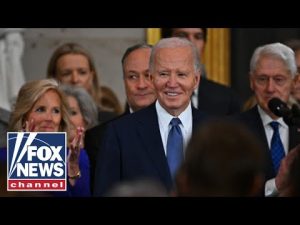As the annual Road to Majority Conference gets underway in Washington D.C., one can sense a palpable buzz of enthusiasm and optimism swirling through the air. This significant gathering, hosted by the Faith and Freedom Coalition, showcases a lineup of key conservative voices rallying their troops ahead of the 2026 midterm elections. With President Trump at the heart of the excitement, the conference doubles as a testament to both his enduring influence and the accomplishments deemed important by the attending conservatives.
President Trump, evidently aware of the finite nature of his political career, appears to be working with commendable fervor to address national and global issues. The sense that he is engaged in some God-given mission reverberates through the conference halls, urging attendees to ponder their own purposes. Attendees are asked to consider how they can support President Trump’s agenda and continue his legacy. Reactions from the crowd suggest a united effort to bolster Trump’s vision for the country and ensure its endurance beyond his presidency.
There is no shortage of praise for Trump’s strides in various areas, most notably his protection of religious liberties. As a cornerstone of American freedom, religious liberty is held in high regard by the conference’s participants, who remember the days of apparent governmental overreach under President Biden’s administration. The contrast is clear: Trump is seen as the defender, protecting churches from perceived threats. The objective is to formally enshrine religious liberty into law, ensuring future administrations cannot interfere—certainly a plan to safeguard their interests in the long term.
Survey results highlighted in discussions reflect surprising shifts in voter demographics. President Trump’s approval is notably up across several demographics, including women, Hispanic, Black, and young voters. The conference’s attendees collectively express no surprise at these findings, pointing to recent actions perceived as common sense that appeal to these groups. There’s an air of vindication for conference-goers, who believe that sensible Americans are recognizing the difference between Trump’s leadership and the left’s alleged extremes. Apparently, the nation is waking up from its slumber, and with a touch of amused sarcasm, participants wonder how some corners of the country still lean toward alternative ideologies.
Rev. Jeffress, a keynote speaker, notes the strength of the support base President Trump is building. At his church, the diverse congregation, including many Hispanic members, echoes the sentiments observed from the broader population. This support isn’t simply a reluctant acceptance; it’s the hopeful anticipation of more achievements under Trump’s lead. Church leaders, like Jeffress, express an unwavering belief in Trump’s promise to continue delivering results that will ripple across America and perhaps even the world. This blend of faith, politics, and patriotism keeps the conference energized with the hope that President Trump’s endeavors will transcend the barriers set by his opposition, securing a bright, conservative future.







